人教新目标八年级上册-英语语法知识点精讲及练习(含答案)
(新版)新目标英语八年级上册Unit03语法知识点

Unit 3 I’m more outgoing than my sister.Section A (1a —Grammar Focus)● 1.“Is this/that …?”用于交际场合,尤其是互相介绍和询问时,this和that指“这位”“那位”或“这个人”“那个人”。
—Is this Miss Wang?—Yes, it is.2. this/that还用于电话用语中,在打电话时问“你是……吗?”用“Is that …?”,回答“我是……”用“This is…(speaking).”—Is that Li Lei?—No, this is Li Ping (speaking).●Sam has longer hair than Tom = Sam’s hair is longer than Tom’s(=Tom’s hair,不能用Tom,只能同类事物相比较).● 1. Both…and…“……两者都”,连接名词或代词作主语,其后的谓语动词用复数形式,其否定形式可为“neither…nor…”。
Both you and I are in Class Five.否定形式:Both you and I aren’t in Class Five. 我和你不都在5班。
(不完全否定)Neither you nor I am (就近原则) in Class Five. 我和你都不在5班。
(完全否定)2. pron./adv. both(两者)否定为:neither(两者中)任何一个不all(三者或三者以上)否定为:none(三者或三者以上)没有人或没有物。
All of them are English. = They are all English. 他们都是英国人。
否定:None of them is (are) English. 他们都不是英国人。
Both of them are doctors. = They are both doctors. 他们俩都是医生。
人教新目标英语八年级上册Unit-4重难点总结+练习题(含答案)
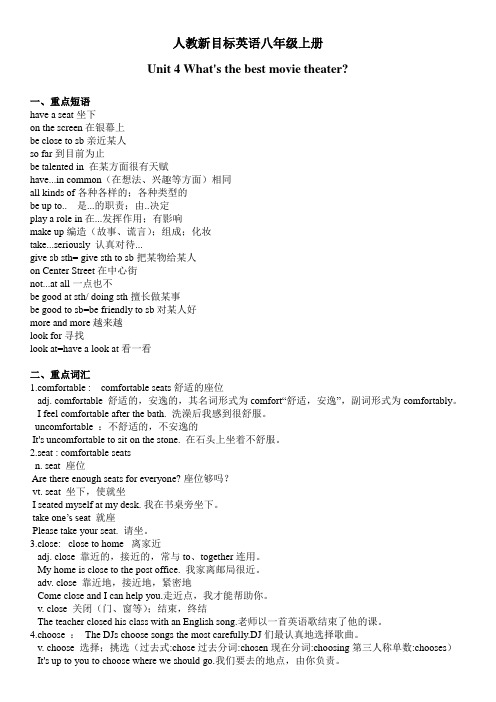
人教新目标英语八年级上册Unit 4 What's the best movie theater?一、重点短语have a seat坐下on the screen在银幕上be close to sb亲近某人so far到目前为止be talented in 在某方面很有天赋have...in common(在想法、兴趣等方面)相同all kinds of各种各样的;各种类型的be up to.. 是...的职责;由..决定play a role in在...发挥作用;有影响make up编造(故事、谎言);组成;化妆take...seriously 认真对待...give sb sth= give sth to sb把某物给某人on Center Street在中心街not...at all一点也不be good at sth/ doing sth擅长做某事be good to sb=be friendly to sb对某人好more and more越来越look for寻找look at=have a look at看一看二、重点词汇fortable : comfortable seats舒适的座位adj. comfortable 舒适的,安逸的,其名词形式为comfort“舒适,安逸”,副词形式为comfortably。
I feel comfortable after the bath. 洗澡后我感到很舒服。
uncomfortable :不舒适的,不安逸的It's uncomfortable to sit on the stone. 在石头上坐着不舒服。
2.seat : comfortable seatsn. seat 座位Are there enough seats for everyone? 座位够吗?vt. seat 坐下,使就坐I seated myself at my desk. 我在书桌旁坐下。
8年级上英语语法重点和知识点归纳精讲
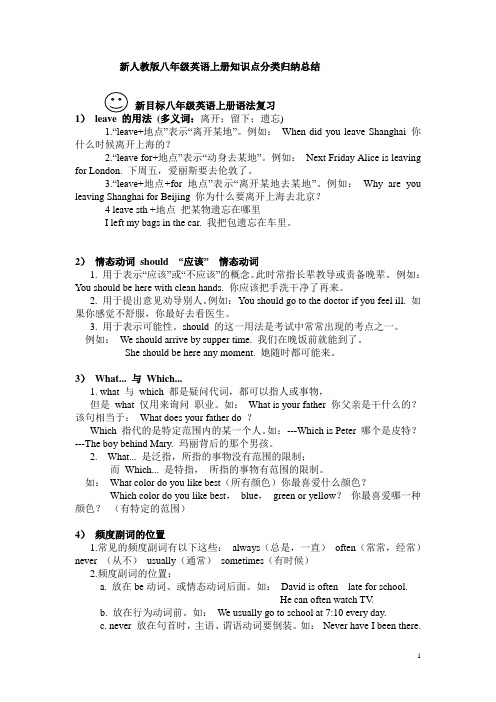
新人教版八年级英语上册知识点分类归纳总结新目标八年级英语上册语法复习1)(多义词:离开;留下;遗忘)1.“leave+地点”表示“离开某地”。
例如:When did you leave Shanghai 你什么时候离开上海的?2.“leave for+地点”表示“动身去某地”。
例如:Next Friday Alice is leaving for London. 下周五,爱丽斯要去伦敦了。
3.“leave+地点+for地点”表示“离开某地去某地”。
例如:Why are you leaving Shanghai for Beijing 你为什么要离开上海去北京?4 leave sth +地点把某物遗忘在哪里I left my bags in the car. 我把包遗忘在车里。
2)情态动词should “应该” 情态动词1. 用于表示“应该”或“不应该”的概念。
此时常指长辈教导或责备晚辈。
例如:You should be here with clean hands. 你应该把手洗干净了再来。
2. 用于提出意见劝导别人。
例如:You should go to the doctor if you feel ill. 如果你感觉不舒服,你最好去看医生。
3. 用于表示可能性。
should 的这一用法是考试中常常出现的考点之一。
例如:We should arrive by supper time. 我们在晚饭前就能到了。
She should be here any moment. 她随时都可能来。
3)What... 与Which...1. what 与which 都是疑问代词,都可以指人或事物,但是what 仅用来询问职业。
如:What is your father 你父亲是干什么的?该句相当于:What does your father do ?Which 指代的是特定范围内的某一个人。
如:---Which is Peter 哪个是皮特?---The boy behind Mary. 玛丽背后的那个男孩。
unit8《howwasyourschooltrip》知识讲解及练习含答案(人教新目标初二上)doc初中英语
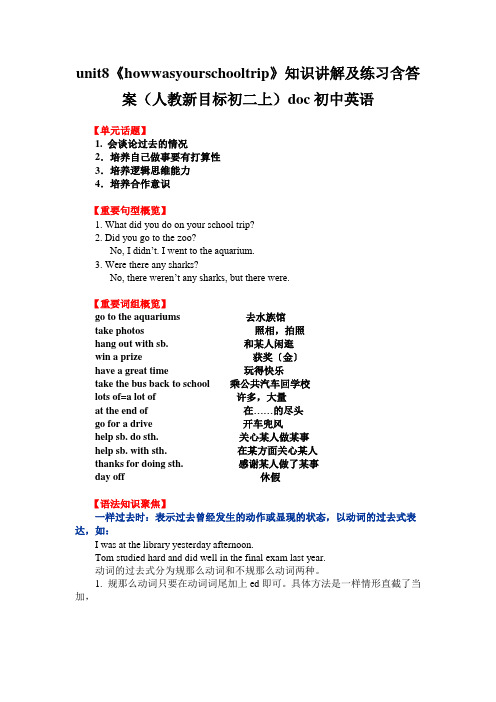
unit8《howwasyourschooltrip》知识讲解及练习含答案(人教新目标初二上)doc初中英语【单元话题】1. 会谈论过去的情况2.培养自己做事要有打算性3.培养逻辑思维能力4.培养合作意识【重要句型概览】1. What did you do on your school trip?2. Did you go to the zoo?No, I didn’t. I went to the aquarium.3. Were there any sharks?No, there weren’t any sharks, but there were.【重要词组概览】go to the aquariums去水族馆take photos照相,拍照hang out with sb.和某人闲逛win a prize获奖〔金〕have a great time玩得快乐take the bus back to school乘公共汽车回学校lots of=a lot of许多,大量at the end of在……的尽头go for a drive开车兜风help sb. do sth.关心某人做某事help sb. with sth.在某方面关心某人thanks for doing sth.感谢某人做了某事day off休假【语法知识聚焦】一样过去时:表示过去曾经发生的动作或显现的状态,以动词的过去式表达,如:I was at the library yesterday afternoon.Tom studied hard and did well in the final exam last year.动词的过去式分为规那么动词和不规那么动词两种。
1. 规那么动词只要在动词词尾加上ed即可。
具体方法是一样情形直截了当加,如:clean—cleaned;2. 词尾是不发音字母e的,可只加上d,如:like—liked;3. 词尾为重读闭音节,结尾只有一个辅音字母的,应双写该辅音字母,再加上ed,如:stop—stopped;4. 词尾为辅音字母加y的,应将y改为i再加上ed,如:study studie5. 不规那么动词有其自己的变化形式,只能分不经历。
人教新目标版八年级英语上册Unit3语法、知识点归纳及训练
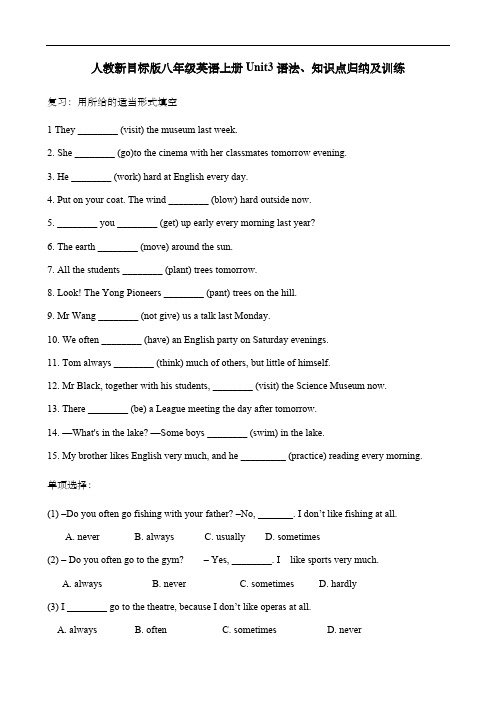
人教新目标版八年级英语上册Unit3语法、知识点归纳及训练复习:用所给的适当形式填空1 They ________ (visit) the museum last week.2. She ________ (go)to the cinema with her classmates tomorrow evening.3. He ________ (work) hard at English every day.4. Put on your coat. The wind ________ (blow) hard outside now.5. ________ you ________ (get) up early every morning last year?6. The earth ________ (move) around the sun.7. All the students ________ (plant) trees tomorrow.8. Look! The Yong Pioneers ________ (pant) trees on the hill.9. Mr Wang ________ (not give) us a talk last Monday.10. We often ________ (have) an English party on Saturday evenings.11. Tom always ________ (think) much of others, but little of himself.12. Mr Black, together with his students, ________ (visit) the Science Museum now.13. There ________ (be) a League meeting the day after tomorrow.14. —What's in the lake? —Some boys ________ (swim) in the lake.15. My brother likes English very much, and he _________ (practice) reading every morning.单项选择:(1) –Do you often go fishing with your father? –No, _______. I don’t like fishing at all.A. neverB. alwaysC. usuallyD. sometimes(2) – Do you often go to the gym? – Yes, ________. I like sports very much.A. alwaysB. neverC. sometimesD. hardly(3) I ________ go to the theatre, because I don’t like operas at all.A. alwaysB. oftenC. sometimesD. never(4) He says he will come to see us tomorrow afternoon.A. sometimeB. some timeC. sometimesD. some times(5) Speak aloud, please! I can _____ hear you.A. almostB. hardlyC. usuallyD. sometimes(6) My cousin wants to keep slim. She does exercise every morning and __ eats meat.A. hardlyB. alwaysC. usuallyD. often(7) —Miss Zhou is very popular with the students.—Yes. Her classes are_________ lively and interesting.A. alwaysB. sometimesC. hardlyD. never(8) —Have you ever been to Disneyland?—No, ______.I hope I can go there next year.A. alwaysB. sometimesC. neverD. often(9) —Zhang Lili, "the most beautiful teacher", has moved us deeply.—Yes, and she is__________ popular with her students.A. sometimesB. neverC. alwaysD. hardly(10) I don’t think fast food is good for our health, so I _______ go to MacDonald.A. hardlyB. alwaysC. usuallyD. often语法学习:形容词是用来修饰名词或不定代词,说明事物和人的性质和特征的一类词,在句子中用作定语、表语、宾语补足语;而副词用以修饰动词、形容词或其他副词,在句子中作状语、表语、补语和定语。
八年级英语上册Unit7短语语法知识点汇总(人教新目标版)
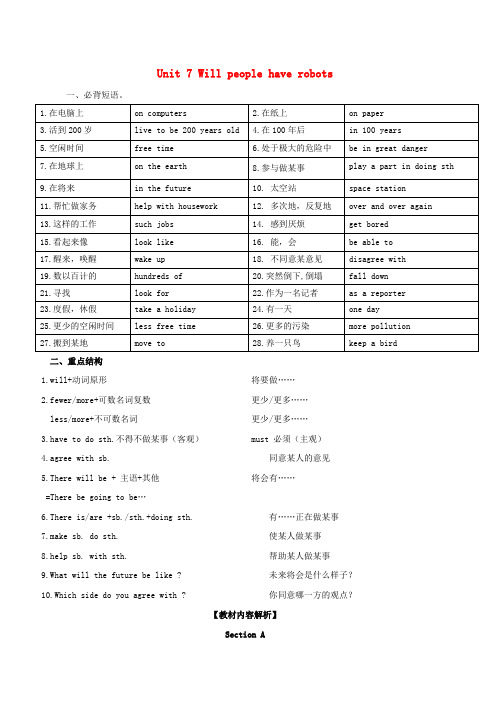
Unit 7 Will people have robots一、必背短语。
二、重点结构1.will+动词原形将要做……2.fewer/more+可数名词复数更少/更多……less/more+不可数名词更少/更多……3.have to do sth.不得不做某事(客观)must 必须(主观)4.agree with sb. 同意某人的意见5.There will be + 主语+其他将会有……=There be going to be…6.There is/are +sb./sth.+doing sth. 有……正在做某事7.make sb. do sth. 使某人做某事8.help sb. with sth. 帮助某人做某事9.What will the future be like ? 未来将会是什么样子?10.Which side do you agree with ? 你同意哪一方的观点?【教材内容解析】Section A1.Do you think there will be robots in people’s homes? (P. 49)本句是主从复合句,从句为宾语从句,如果do you think放在句中,则为插入语,放在特殊疑问词后面,结构为:疑问词+do you think+主语+谓语+其它。
例句:Which do you think is the best movie theatre?2.People will l ive to be 200 years old. (P. 49)live to be+基数词+years old意为“活到……岁”。
例句:In the story, people will live to be 500 years old.3.Will people use money in 100 years? (P. 49)“in+一段时间”表示“在……之后”或“在……之内”,通常用于一般将来时,常用来回答how soon的提问;“for+一段时间”则表示持续多长时间,用来回答how long的提问。
新目标八年级上册英语语法知识点
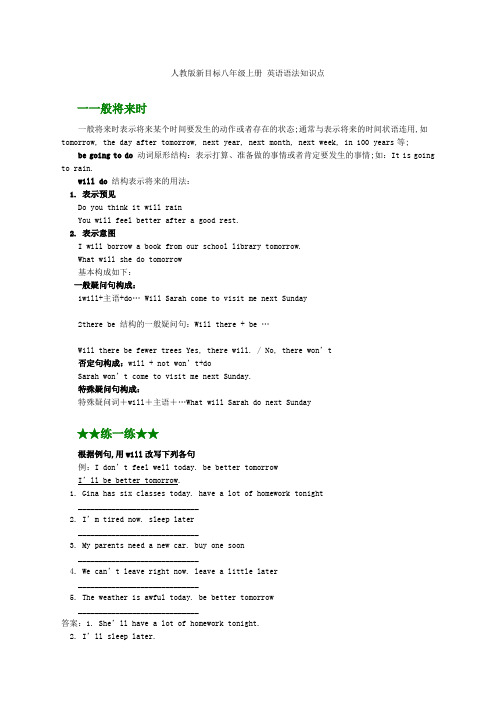
人教版新目标八年级上册英语语法知识点一一般将来时一般将来时表示将来某个时间要发生的动作或者存在的状态;通常与表示将来的时间状语连用,如tomorrow, the day after tomorrow, next year, next month, next week, in 100 years等;be going to do动词原形结构:表示打算、准备做的事情或者肯定要发生的事情;如:It is going to rain.will do结构表示将来的用法:1. 表示预见Do you think it will rainYou will feel better after a good rest.2. 表示意图I will borrow a book from our school library tomorrow.What will she do tomorrow基本构成如下:一般疑问句构成:1will+主语+do… Will Sarah come to visit me next Sunday2there be 结构的一般疑问句:Will there + be …Will there be fewer trees Yes, there will. / No, there won’t否定句构成:will + not won’t+doSarah won’t come to visit me next Sunday.特殊疑问句构成:特殊疑问词+will+主语+…What will Sarah do next Sunday★★练一练★★根据例句,用will改写下列各句例:I don’t feel well today. be better tomorrowI’ll be better tomorrow.1. Gina has six classes today. have a lot of homework tonight_____________________________2. I’m tired now. sleep later_____________________________3. My parents need a new car. buy one soon_____________________________4. We can’t leave right now. leave a little later_____________________________5. The weather is awful today. be better tomorrow_____________________________答案:1. She’ll have a lot of homework tonight.2. I’ll sleep later.3. They’ll buy one soon.4. We’ll leave a little later.5. Maybe it’ll be better tomorrow.二should的用法:should用来提出建议和忠告,后边加动词原形,否定句直接在should后边加not.例如:I think you should eat less junk food.我认为你应该少吃垃圾食品;She drives a lot and she seldom walks. So I think she should walk a lot.她经常开车,很少走路;所以我认为她应该多走路;Students shouldn’t spend too much time playing computer games.学生们不应当花太多的时间玩计算机游戏;学习向别人提建议的几种句式:1I think you should…2Well, you could…3Maybe you should …4Why don’t you…5What about doing sth.6You’d better do sth.★★练一练★★用should或shouldn’t填空1. I can’t sleep the night before exams.You ______ take a warm shower before you go to bed.2. Good friends ______ argue each other.3. There is little milk in the glass. We _______ buy some.4. They didn’t invite you Maybe you ______ be friendlier.5. I am a little bit overweight. So I think I _______ do exercises every day.答案:1. should 2. shouldn’t 3. should 4. should 5. should三过去进行时过去进行时表示过去某一点时间正在进行的动作或者过去某一段时间内一直进行的动作;1. 构成was /were + doing,例如:I was watching TV at 9 o’clock last night.at 9 o’clock last night是时间点They were playing football all afternoon.all afternoon是时间段2. 过去进行时的标志词at 8 o’clock last night, this time yesterday等;例如:I was having lunch at home this time yesterday.昨天的这个时候我正在吃午饭;At that time she was writing a book.那阵子她在写一本书;表示她在那段时间里一直在做那件事情;★★练一练★★用括号中所给动词的适当形式填空;1. This time yesterday I ____ ______readbooks.2. At 9 o’clock last Sunday they ______ ______havea party.3. When I _____comeinto the classroom, she ________ ______reada storybook.4. She _____ ______playcomputer games while her mother ____ ______cookyesterday afternoon.5. I _____ ______havea shower when you _______callme yesterday.答案:1. was reading 2. were having 3. came; was reading4. was playing; was cooking5. was having; called四间接引语形成步骤:1不要逗号,冒号,引号2要考虑到人称的变化人称的变化与汉语是一致的3要考虑时态的变化4要考虑时间状语、地点状语和语示代词的变化;★★练一练★★用括号中所给动词的适当形式填空;1. She said I _____behard-working.2. Peter told me he _____bebored yesterday.3. She said she _____goswimming last Sunday.4. Bobby said he _____maycall me later.5. Antonio told me he _____reada book then.答案:1. was 2. was 3. went 4. might 5. was reading请转述他人说的话:1. I go to the beach every Saturday. Tom2. I can speak three languages. Lucy3. I will call you tomorrow. Mike4. I’m having a surprise party for Lana. she五if引导的条件状语从句结构:if+一般现在时,主语+将来时含义:如果……,将要……例如:If you ask him, he will help you.如果你请求他,他会帮助你;If need be, we’ll work all night.如果需要,我们就干个通宵;★★练一练★★根据中文提示,完成句子;1. 如果你参加聚会,你将会过得很开心;If you ________ the party, you __________.2. 如果明天下雨,我们将不去野餐;If it __________ tomorrow, we ___________.3. 如果你经常听英文歌,你将会喜欢英语的;If you often ________, you _________________.答案:1. If you go to the party, you will have a good time2. If it rains tomorrow, we won’t go to the picnic3. If you often listen to English songs, you’ll like English二. 完形填空特点及解题思路一题型分类与特点完形填空试题是在给出的一篇短文中有目的地拿掉若干个词,留下一些空格,要求考生借助短文保留的部分,从所给的短文整体出发,在正确理解短文意思的基础上,根据句子和句子间的内在联系、词的用法和习惯搭配等,用适当的词或词语填空,使补全后的短文意思通顺、前后连贯、结构完整;这种题型测试的内容从形式上看是单词或短语的填空,但它必须注意到短文中上、下文意思连贯、词语搭配和语法结构正确,所以在空格上所填的词必须符合语义适用和语法正确两条原则,只考虑某一侧面都可能导致错误;中考中完形填空试题的基本题型分两类:完形填空选择题和完形填空题;1. 完形填空选择题:该题型的特点是将一篇短文中若干词语抽掉留下空格,对每一空格提供若干个选择项,要求考生通读短文后,在理解短文意思的基础上,运用所学的词汇、句型、语法等语言知识,从所提供的备选项中选出一个最佳答案,使短文内容完整正确;中考完形填空主要以这种题型为主;它所给的短文一般与初中英语教材难易程度相当,字数在150-200个单词之内,多数设置10个左右空格,所设考点涉及词汇、语法及对短文内容的理解;短文的第一句一般不设空,以期提供一个语境,对每一空格设置的选项基本都属于相同或对等的词类,给判定选择带来一定的干扰,侧重考查了考生准确运用词汇的能力及对短文的整体理解和逻辑推理能力;2. 选词填空题:该题型的特点是把抽出的词打乱顺序,不按原文顺序排列,放在短文前面或后面的方框内,有时还增加几个文外的词,要求考生从中选出适当的词以正确的形式填入短文空格内;AJack wanted to ask for two days off, 1 he had only learnt the phrase 短语“have a day off”. He 2 , then he had an idea. “Grandmother is ill. May I have a day off, 3 ”he asked the teacher. “Of course, you can. ”replied 答复the teacher at once. After a while, the boy came to 4 at the teacher’s door. “May I have a day off 5 ”The teacher was very surprised, “Didn’t you 6 it just now”“Yes, sir. But I can’t be here 7 , either. ”The teacher understood him and could not help 8 . Then he said with a smile, “Why didn’t you say‘May I have two days off ’”The boy answered quickly 9 a loud voice. “But you only 10 us‘have a day off ’”1. A. but B. and C. or D. for2. A. thought hardlyB. thought hard and hardC. hard thoughtD. thought and thought3. A. Miss B. sir C. teacher D. Mr4. A. strike B. best C. hit D. knock5. A. also B. again C. too D. once6. A. speak B. tell C. say D. do7. A. tomorrowB. the day after tomorrowC. yesterdayD. the day before yesterday8. A. laugh B. to laugh C. laughed D. laughing9. A. with B. on C. in D. by10. A. teach B. taught C. are teaching D. were teachingB请根据内容从所给的15个单词中选出最恰当的10个填入空白处,使短文完整,有些词要根据需要作A generation gap 代沟has become a serious problem. I read a _______1about it in the newspaper. Some children have killed _______2after quarrels 争吵with parents. I think this is _______3they don’t have a good talk with each o ther. Parents now spend _______4time in the office. _______5they don’t have much time to stay with their children. As time passes, they both feel _______6they don’t have the same topics话题to talk about. I want to_______7parents to be more with your children, get to know them and understand them. And for children, show your feeling _______8your parents. They are the people who _______9you. So tell them your thoughts 想法. In this way, you can have a better _______10of each other.完形填空选择题的一般解题思路是:1. 跳过空格、通读全文、把握大意;先跳过空格,通读试题所给的要完形填空的短文,获得整体印象,做到弄清文脉、抓住主旨,较好地把握短文大意;要在阅读理解短文意思的基础上才开始判定选择,切忌仓促下笔;2. 结合选项、综合考虑、初定答案;在理解全文意思的基础上,再结合所给备选项细读全文,联系上、下文内容,注意从上、下文的语法结构和词语搭配及从选择项中寻找解题的提示,以词、句的意义为先,再从分析句子结构入手,根据短文意思、语法规则、词语固定搭配等进行综合考虑,对备选项逐一进行分析、比较和筛选,排除干扰项、初步选定答案;3. 瞻前顾后、先易后难、各个击破;动笔时要瞻前顾后、通篇考虑、先易后难;对比较明显直接的、自己最有把握的答案先做,一下子不能确定答案的,先跳过这一空格,继续往下做,最后回过头来再集中精力解决难点;这时可结合已确定答案的选项再读一遍短文,随着对短文理解的深入,可以降低试题的难度,提高选择的正确率;4. 复读全文、逐空验证、弥补疏漏;完成各道题选择后,把所选的答案代入原文,再把全文通读一篇,逐空认真复查;看所选定的答案是否使短文意思前后连贯、顺理成章,语法结构是否正确,是否符合习惯表达法;如发现错误答案或有疑问的,应再次推敲、反复斟酌、做出修正;完形填空试题的一般解题思路是:1. 跳过空格、通读短文、了解大意;解题时先跳过空格,通读完形填空的短文,了解全篇的内容和要旨;要重视首句,善于以首句的时态、语气为立足点,理清文脉,推测全文主题及大意;2. 复读短文、确定语义、判断词形;把握短文大意后再认真复读短文,利用上下文的语境,结合所学过的知识,先确定空格处所需词语的意义,再根据空格在句子中的位置,判断其在句中充当的成分,从而确定所填词的词性,再依据词语搭配和语法规则,判断所填的词的正确形式;3. 三读短文、上下参照、验证答案;在短文的每一空白处填上一个词后,将完成的短文再细读一遍,上下参照,连贯思考;把所填的答案放入短文中进行检验,可从上、下文内容是否协调一致、顺理成章,语法结构是否正确无误等进行综合验证,凡有疑问必须重新推敲考虑;。
新目标人教版初中八年级上册英语语法汇总

新目标人教版初中八年级上册英语语法汇总1) leave的用法1.“leave+地点”表示“离开某地”。
例如When did you leave Shanghai?你什么时候离开上海的2.“leave for+地点”表示“动身去某地”。
例如Next Friday, Alice is leaving for London. 下周五爱丽斯要去伦敦了。
3.“leave+地点+for+地点”表示“离开某地去某地”。
例如Why are you leaving Shanghai for Beijing?你为什么要离开上海去北京2) 情态动词should“应该”学会使用should作为情态动词用常常表示意外、惊奇、不能理解等有“竟会”的意思例如How should I know? 我怎么知道Why should you be so late today?你今天为什么来得这么晚should有时表示应当做或发生的事例如We should help each other.我们应当互相帮助。
我们在使用时要注意以下几点1. 用于表示“应该”或“不应该”的概念。
此时常指长辈教导或责备晚辈。
例如You should be here with clean hands. 你应该把手洗干净了再来。
2. 用于提出意见劝导别人。
例如You should go to the doctor if you feel ill. 如果你感觉不舒服你最好去看医生。
3. 用于表示可能性。
should的这一用法是考试中常常出现的考点之一。
例如We should arrive by supper time. 我们在晚饭前就能到了。
She should be here any moment. 她随时都可能来。
3) What...? 与Which...?1. what 与which 都是疑问代词都可以指人或事物但是what仅用来询问职业。
如Whatis your father? 你父亲是干什么的该句相当于What does your father do?What is your father's job?Which 指代的是特定范围内的某一个人。
- 1、下载文档前请自行甄别文档内容的完整性,平台不提供额外的编辑、内容补充、找答案等附加服务。
- 2、"仅部分预览"的文档,不可在线预览部分如存在完整性等问题,可反馈申请退款(可完整预览的文档不适用该条件!)。
- 3、如文档侵犯您的权益,请联系客服反馈,我们会尽快为您处理(人工客服工作时间:9:00-18:30)。
(一)一般将来时一般将来时表示将来某个时间要发生的动作或者存在的状态。
通常与表示将来的时间状语连用,如tomorrow, the day after tomorrow, next year, next month, next week, in 100 years等。
be going to do(动词原形)结构:表示打算、准备做的事情或者肯定要发生的事情。
如:It is going to rain.will do结构表示将来的用法:1. 表示预见Do you think it will rain?You will feel better after a good rest.2. 表示意图I will borrow a book from our school library tomorrow.What will she do tomorrow?基本构成如下:一般疑问句构成:(1)will+主语+do…? Will Sarah come to visit me next Sunday?(2)there be 结构的一般疑问句:Will there + be …?Will there be fewer trees? Yes, there will. / No, there won’t否定句构成:will + not (won’t)+doSarah won’t come to visit me next Sunday.特殊疑问句构成:特殊疑问词+will+主语+…?What will Sarah do next Sunday?★★练一练★★根据例句,用will改写下列各句例:I don’t feel well today. (be better tomorrow)I’ll be better tomorrow.1. Gina has six classes today. (have a lot of homework tonight)_____________________________2. I’m tired now. (sleep later)_____________________________3. My parents need a new car. (buy one soon)_____________________________4. We can’t leave right now. (leave a little later)_____________________________5. The weather is awful today. (be better tomorrow)_____________________________答案:1. She’ll have a lot of homework tonight.2. I’ll sleep later.3. They’ll buy one soon.4. We’ll leave a little later.5. Maybe it’ll be better tomorrow.(二)should的用法:should用来提出建议和忠告,后边加动词原形,否定句直接在should后边加not.例如:I think you should eat less junk food.我认为你应该少吃垃圾食品。
She drives a lot and she seldom walks. So I think she should walk a lot.她经常开车,很少走路。
所以我认为她应该多走路。
Students shouldn’t spend too much time playing computer games.学生们不应当花太多的时间玩计算机游戏。
学习向别人提建议的几种句式:(1)I think you should…(2)Well, you could…(3)Maybe you should …(4)Why don’t you…?(5)What about doing sth.?(6)You’d better do sth.★★练一练★★用should或shouldn’t填空1. I can’t sleep the night before exams.You ______ take a warm shower before you go to bed.2. Good friends ______ argue each other.3. There is little milk in the glass. We _______ buy some.4. They didn’t invite you? Maybe you ______ be friendlier.5. I am a little bit overweight. So I think I _______ do exercises every day.答案:1. should 2. shouldn’t 3. should 4. should 5. should(三)过去进行时过去进行时表示过去某一点时间正在进行的动作或者过去某一段时间内一直进行的动作。
1. 构成was /were + doing,例如:I was watching TV at 9 o’clock last night.at 9 o’clock last night是时间点They were playing football all afternoon.all afternoon是时间段2. 过去进行时的标志词at 8 o’clock last night, this time yesterday等。
例如:I was having lunch at home this time yesterday.昨天的这个时候我正在吃午饭。
At that time she was writing a book.那阵子她在写一本书。
(表示她在那段时间里一直在做那件事情。
)练一练用括号中所给动词的适当形式填空。
1. This time yesterday I ____ ______(read)books.2. At 9 o’clock last Sunday they ______ ______(have)a party.3. When I _____(come)into the classroom, she ________ ______(read)a storybook.4. She _____ ______(play)computer games while her mother ____ ______(cook)yesterday afternoon.5. I _____ ______(have)a shower when you _______(call)me yesterday.答案:1. was reading 2. were having 3. came; was reading4. was playing; was cooking5. was having; called(四)间接引语形成步骤:(1)不要逗号,冒号,引号(2)要考虑到人称的变化(人称的变化与汉语是一致的)(3)要考虑时态的变化(4)要考虑时间状语、地点状语和语示代词的变化。
1. 直接引语变成间接引语时,几个主要时态的变化规律直接引语间接引语一般现在时一般过去时一般将来时过去将来时现在进行时过去进行时2. 直接引语变成间接引语时,一些词汇的变化规律直接引语1. am / is2. are3. have / has4. will5. can6. may 间接引语1. was2. were3. had4. would5. could6. might练一练用括号中所给动词的适当形式填空。
1. She said I _____(be)hard-working.2. Peter told me he _____(be)bored yesterday.3. She said she _____(go)swimming last Sunday.4. Bobby said he _____(may)call me later.5. Antonio told me he _____(read)a book then.答案:1. was 2. was 3. went 4. might 5. was reading请转述他人说的话:1. I go to the beach every Saturday. (Tom)2. I can speak three languages. (Lucy)3. I will call you tomorrow. (Mike)4. I’m having a surprise party for Lana. (she)(五)if引导的条件状语从句结构:if+一般现在时,主语+将来时含义:如果……,将要……例如:If you ask him, he will help you.如果你请求他,他会帮助你。
If need be, we’ll work all night.练一练根据中文提示,完成句子。
1. 如果你参加聚会,你将会过得很开心。
If you ________ the party, you __________.2. 如果明天下雨,我们将不去野餐。
If it __________ tomorrow, we ___________.3. 如果你经常听英文歌,你将会喜欢英语的。
If you often ________, you _________________.答案:1. If you go to the party, you will have a good time2. If it rains tom orrow, we won’t go to the picnic3. If you often listen to English songs, you’ll like English二. 完形填空特点及解题思路(一)题型分类与特点完形填空试题是在给出的一篇短文中有目的地拿掉若干个词,留下一些空格,要求考生借助短文保留的部分,从所给的短文整体出发,在正确理解短文意思的基础上,根据句子和句子间的内在联系、词的用法和习惯搭配等,用适当的词或词语填空,使补全后的短文意思通顺、前后连贯、结构完整。
这种题型测试的内容从形式上看是单词或短语的填空,但它必须注意到短文中上、下文意思连贯、词语搭配和语法结构正确,所以在空格上所填的词必须符合语义适用和语法正确两条原则,只考虑某一侧面都可能导致错误。
